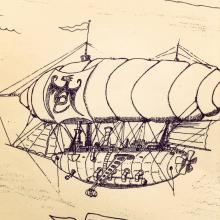inspiration + perspiration = invention :: T. Edison ::
Yesterday was the last day of the blog tour. But since I didn't get my review out until then (instead of Tuesday when I'd planned), I still wanted to offer some closing thoughts that occurred to me as I considered this book and what others have written.

Many people commented on the gorgeous cover. I agree: it intrigued me from the moment I first saw it online, feeling very much like a traditional fantasy. Yet just inside on the map rested a little airship that positively screamed steampunk to me. It quickly became clear from a few chapters in that we weren't dealing with your standard swords and sorcery tale. There were magic beings and magic beasts, but the setting was far to advanced to simply be the usual quasimedevial setting of knights and kings and dragons.
Instead, the island of Faelen feels on the cusp of industrlization. Even "peasants" here don't live and work like you'd typically expect. People are far more merchantile than agrarian, engaged in trade and commerce and moving around a lot. There's also a huge amount of knowledge that's considered basic education. Though a many-times-sold slave, Nym was taught to read, and it appears a common skill for the majority of characters she encounters.
Then there's the big bad kingdom of Bron to the south. We don't know much about them, but we do know they're capable of producing flying airships and aerial explosives, and also have the infrastructure to transport a major army across a sea to attack. Consider that the Allies required months of preparation and the combined resources of multiple nations to make the D-Day landing during World War II. Bron cuts that time down to a mere few weeks from the time of the initial scout to the full invasion, and all on its own initative.
But it's not just the steampunk elements. Several other readers noticed what I did: much of Nym's and Collin's training feels like a superhero story rather than wizard's. I felt shades of X-Men and contemporary spy thrillers amidst the magic. There's no indication magic is plentiful in this world, even if it's acknowledged and lived with to a certain extent. No one casts charms, no one practices spells. Nym and Collin are the exception, and very rare ones at that, having more in common with legends people tell each other than their daily lives.
That's the real kicker: illustrations and setting aside, from the moment the minstrel starts singing about the glorified past on page four, you realize that you're on the tail end of this society's legends rather than the start. People aren't looking for a sign to save them but physical humanity. Even if Faelen isn't as far advanced as its neighbors, it's well on its way toward entering the modern age of skepticism, reason, and humanistic thinking. Those were the hallmarks of the Victorian area, which is usually the setting of steampunk adventures.
So, is Storm Siren truly fantasy? Or is it steampunk? Or is it possibly both?
Here's what I wrote last year about classifying speculative genres:
[Science fiction is] a genre that is rooted in an exploration of ideas, often in space, sometimes here on Earth, but always looking toward something unknown and wondering, "What if that were true: how would we live?" Pioneers of the genre looked at the contemporary world around them and pushed things to their limits... Fantasy, of course, also wonders about the unknown. I'd say fantasy, by and large, as we understand it today, draws on the established mythos and beliefs of a culture to develop the world of the story....
If fantasy is the method of using common cultural touchstones to create a fresh story, and science is the language of our current culture, then there is only one conclusion we can draw: science fiction is the new fantasy.
As we move farther into the future, our historic past gets larger. The middle ages is now one more century removed from us than during Tolkien's day. Just as the first fantasy authors mined the mythology of ancient cultures to explore questions about their time, so now authors are taking cues from just as removed and mythological a past to fuel their imaginations. That past is just a little closer to our current time was previously true.
So I'll go out on a limb and say that Storm Siren is a steampunk fantasy: not quite one or the other, but a generous helping of both. By the looks of the sequel's cover and the next book's description, I think the 'punk elements will grow even stronger. Now that the two kingdoms are at peace and Faelen needs to rebuild, I predict the island nation's about to go through some rapid development and infusion of new technology. It's a new kind of fantasy concept ideally suited for this newer form of historicity: the idea that a peace between two unequally matched civilizations can be just as destructive as war.
I look forward to how Weber will continue to stir the soup as her series progresses. Thanks to all my fellow bloggers who took part in this tour (for a list, you can see the initial posting here).
How about you? Any books you've read lately that stradle the divide between genres and subgenres, or give birth to something new?





